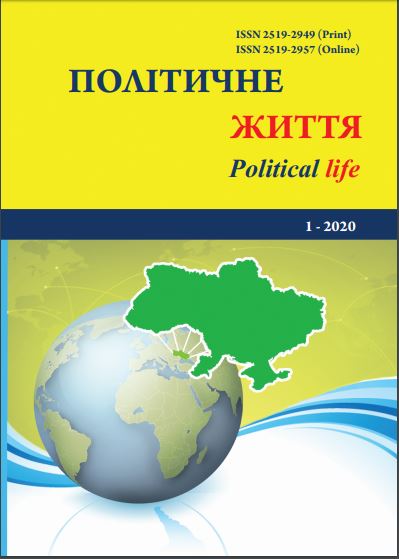The US–EU relationship in the context of security challenges in the Middle East under the D. Trump presidency.
DOI:
https://doi.org/10.31558/2519-2949.2020.1.14Keywords:
the USA, the EU, the Middle East, problems of security, D. TrumpAbstract
The purpose of this article is to analyze the transatlantic relations in the Middle East under the D. Trump administration. The research presents comparative analysis of US and EU policy toward main regional security issues – the Iranian nuclear program, the Arab-Israeli conflict and the Syrian crisis. It also examines the differences in American and European approaches to these problems and their impact on the transatlantic relations.
The author came into conclusion that under the D. Trump presidency the contradictions between two actors in the Middle East have deepened. This was due to D. Trump's abrupt departure from the policies of his predecessors, as well as to his unilateral decision making. А series of contradictory steps by the American president were not supported by European allies: withdrawal from the agreement on the Iranian nuclear program; US unconditional support to Israel, including the relocation of the US embassy to Jerusalem and recognition of Israeli sovereignty over the Golan Heights; the decision to withdraw troops from Syria.
While the United States is showing a declining interest in the Middle East, the importance of the region for European security is growing. Trump administration’s unilateral steps, as well as the differences in US and European views on important regional security issues, will require a more independent policy on the part of the European Union. However, a number of objective circumstances, above all, contradictions within the EU itself, do not allow it to act as an effective actor in the Middle East. If US involvement in the region wanes, Europe will increasingly be pushed to work with alternative powers, such as Russia and China, to further its interests.
References
Alcaro R., Dessi A. Last Line of Defence: A Strategy for Europe to Preserve the Iran Nuclear Deal. Istituto Affari Internazionali Research Paper. 2019. № 19. URL: https://www.iai.it/sites/default/files/iaip1914.pdf (дата звернення: 03.02.2020).
Declaration by the High Representative on Behalf of the EU on the Golan Heights. 27.03.2019. URL: https://eeas.europa.eu/delegations/peru/60277/declaration-high-representative-behalf-eu-golan-heights_en (дата звернення: 10.02.2020).
France’s Macron «Deeply Regrets» Trump Decision to Withdraw US Troops from Syria. 23.12.2018. URL: https://www.france24.com/en/20181223-france-chad-macron-withdraw-troops-syria-trump-terrorism-deby-military-sahel (дата звернення: 10.02.2020).
Full Text of Pompeo’s Statement on Settlements. 27.11.2019. URL: https://www.timesofisrael.com/full-text-of-pompeos-statement-on-settlements/ (дата звернення: 05.02.2020).
Geranmayer E. Europe’s New Gamble: Dispute Resolution and the Iran Nuclear Deal. The European Council on Foreign Relations Commentary. 15.01.2020. URL: https://www.ecfr.eu/article/commentary_europes_new_gamble_dispute_resolution_and_the_iran_nuclear_deal (дата звернення: 29.01.2020).
Indyk M. Disaster in the Desert. Why Trump’s Middle East Plan Can’t Work. Foreign Affairs. 2019. Vol. 98. № 6. P. 10–21.
Kausch K. Balancing Trumpism: Transatlantic Divergence in the Middle East. The German Marshall Fund of the United States Policy Paper. 2018. № 38. URL: http://www.gmfus.org/publications/balancing-trumpism-transatlantic-divergence-middle-east (дата звернення: 10.02.2020).
Oppenheim B., Scazzieri L. The EU, the US and the Middle East Peace Process: Two-state Solution – or Dissolution? Center for European Reform Insight. 11.07.2019. URL: https://www.cer.eu/sites/default/ files/insight_BO_LS_11.7.19.pdf (дата звернення: 03.02.2020).
«Peace to Prosperity. A Vision to Improve the Lives of the Palestinian and Israeli People». 28.01.2020.
URL: https://www.whitehouse.gov/wp-content/uploads/2020/01/Peace-to-Prosperity-0120.pdf
(дата звернення: 02.02.2020).
Pierini M. The Crisis of the European Project and Its Consequences for the Euro-Mediterranean Agenda. EMed Mediterranean Yearbook 2018. URL: https://www.iemed.org/observatori/arees-danalisi/arxius-adjunts/ anuari/med.2018/IEMed_Crisis_EU_project_Medyearbook2018_Marc_Pierini.pdf (дата звернення: 10.02.2020).
Pompeo: European Response to Suleimani Killing «not Helpful Enough». 04.01.2020.
URL: https://www.theguardian.com/us-news/2020/jan/04/mike-pompeo-european-response-to-suleimani-killing
(дата звернення: 10.02.2020).
Presidential Proclamation Recognizing Jerusalem as the Capital of the State of Israel and Relocating the United States Embassy to Israel to Jerusalem. 06.12.2017. URL: https://www.whitehouse.gov/presidential-actions/ presidential-proclamation-recognizing-jerusalem-capital-state-israel-relocating-united-states-embassy-israel-jerusalem/ (дата звернення: 25.01.2020).
Proclamation on Recognizing the Golan Heights as Part of the State of Israel. 25.03.2019.
URL: https://www.whitehouse.gov/presidential-actions/proclamation-recognizing-golan-heights-part-state-israel/ (дата звернення: 25.01.2020).
Rapnouil M. Alone in the Desert? How France Can Lead Europe in the Middle East.
The European Council on Foreign Relations Policy Brief. April 2018. URL: https://www.ecfr.eu/page/-/ alone_in_the_desert_how_france_can_lead_europe_in_the_middle_east_.pdf (дата звернення: 10.02.2020).
Remarks by HR/VP Mogherini at the Press Conference Following Ministerial Meetings of the EU/E3 and Iran. 15.05.2018. URL: https://eeas.europa.eu/headquarters/headquarters-homepage/44599/
remarks-hrvp-mogherini-press-conference-following-ministerial-meetings-eue3-and-eue3-and-iran_en
(дата звернення: 10.02.2020).
Remarks by President Trump on the Joint Comprehensive Plan of Action. 08.05.2018.
URL: https://www.whitehouse.gov/briefings-statements/remarks-president-trump-joint-comprehensive-plan-action/ (дата звернення: 25.01.2020).
Scazzieri L. A Troubled Partnership: The US and Europe in the Middle East. Center for European Reform Policy Brief. July 2019. URL: https://www.cer.eu/sites/default/files/pbrief_middle_east_10.7.19.pdf
(дата звернення: 02.02.2020).
Statement by High Representative/Vice-President Federica Mogherini on Israeli Settlement Policy. 18.11.2019. URL: https://eeas.europa.eu/delegations/palestine-occupied-palestinian-territory-west-bank-and-gaza-strip/70610/statement-high-representativevice-president-federica-mogherini-israeli-settlement-policy_en
(дата звернення: 10.02.2020).
Stelzenmuller C. Hostile Ally. The Trump Challenge and Europe’s Inadequate Response. Brookings Institutions Report. August 2019. URL: https://www.brookings.edu/wp-content/uploads/2019/08/ FP_20190905_hostile_ally.pdf (дата звернення: 05.02.2020).
Thepaut C., DeLozier E. Europe Is Creating an Opportunity for Iran Talks, and Washington
Should Take It. The Washington Institute for Near East Policy PolicyWatch. 2020. № 3242.
URL: https://www.washingtoninstitute.org/policy-analysis/view/europe-is-creating-an-opportunity-
for-iran-talks-and-washington-should-take (дата звернення: 10.02.2020).
Therme C. The Rise of Tensions between Iran and Europe: the Trump Factor. The International Institute
for Security Studies Analysis. 01.03.2019. URL: https://www.iiss.org/blogs/analysis/2019/03/iran-and-europe-rise-
of-tensions (дата звернення: 29.01.2020).
Wechsler W. US Withdrawal from the Middle East: Perceptions and Reality / Mezran К., Varvelli A. eds, The MENA Region: а Great Power Competition. Atlantic Council. 2019. P. 13–39. URL: https://atlanticcouncil.org/ wp-content/uploads/2019/10/MENA-Region-Great-Power-Competition-Report-Web-2.pdf
(дата звернення: 10.02.2020).
Zakharchenko A. The EU Policy towards Syria after 2011 / Brusilovska O., Koval I. eds, Prospects
of Development in EU Politics: Global and Regional Dimensions. Odessa: Odessa Mechnikov National University Press, 2019. P. 103–116.

